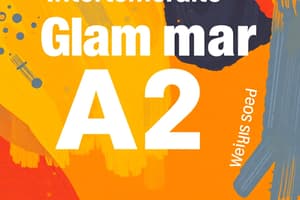Podcast
Questions and Answers
What is the correct form of the verb to complete the sentence: 'I think you __________ him instead.'
What is the correct form of the verb to complete the sentence: 'I think you __________ him instead.'
- ought to have phoned
- should phone (correct)
- couldn't have phoned
- had phoned
They finally decided to get married after knowing each other for a long time.
They finally decided to get married after knowing each other for a long time.
True (A)
What does the sentence 'Nobody __________ him for weeks.' imply about the subject?
What does the sentence 'Nobody __________ him for weeks.' imply about the subject?
has seen
I promise that I will be here when you come back, but I'm afraid everyone else __________ by then.
I promise that I will be here when you come back, but I'm afraid everyone else __________ by then.
Match the following verb phrases with their appropriate forms:
Match the following verb phrases with their appropriate forms:
Which of the following sentences correctly uses the present perfect tense?
Which of the following sentences correctly uses the present perfect tense?
The sentence 'He graduated from the university in 1995' uses the past perfect tense.
The sentence 'He graduated from the university in 1995' uses the past perfect tense.
What did everyone object to?
What did everyone object to?
I __________ an interesting program before they came.
I __________ an interesting program before they came.
Which option correctly completes the sentence: 'They __________ together for almost a year at the time.'?
Which option correctly completes the sentence: 'They __________ together for almost a year at the time.'?
The phrase 'He has been spending two years in the army' is grammatically correct.
The phrase 'He has been spending two years in the army' is grammatically correct.
When I __________ on you that early, you were sleeping.
When I __________ on you that early, you were sleeping.
Match the tenses with their descriptions:
Match the tenses with their descriptions:
Which option correctly fills the blank: 'I think she _______.'
Which option correctly fills the blank: 'I think she _______.'
'Her brothers, who lives in Manisa, comes to visit her every so often.' is a grammatically correct statement.
'Her brothers, who lives in Manisa, comes to visit her every so often.' is a grammatically correct statement.
What does the phrase 'a total lack of interest in men' imply?
What does the phrase 'a total lack of interest in men' imply?
I really __________ fishing with my friends.
I really __________ fishing with my friends.
What is the correct option for this sentence: 'She is one of those women who _________ you crazy.'
What is the correct option for this sentence: 'She is one of those women who _________ you crazy.'
The phrase 'I was down with the flu' indicates that the person was sick.
The phrase 'I was down with the flu' indicates that the person was sick.
Match the following phrases with their meanings:
Match the following phrases with their meanings:
Her brothers, __________ come to visit her every so often.
Her brothers, __________ come to visit her every so often.
Which of the following options correctly completes the sentence: 'I was under the impression that you too..............'?
Which of the following options correctly completes the sentence: 'I was under the impression that you too..............'?
The phrase 'together with six other Arab countries' suggests that Jordan is alone in its decision to negotiate peace.
The phrase 'together with six other Arab countries' suggests that Jordan is alone in its decision to negotiate peace.
What did I suppose to do if I had gone down to Bodrum with my friends?
What did I suppose to do if I had gone down to Bodrum with my friends?
Jordan, together with six other Arab countries, _____ said to be ready for peace negotiations with Israel.
Jordan, together with six other Arab countries, _____ said to be ready for peace negotiations with Israel.
Which of these is a plausible response to: 'I asked two people the way to the station, but............... could help me.'?
Which of these is a plausible response to: 'I asked two people the way to the station, but............... could help me.'?
Match the phrases with their correct contexts:
Match the phrases with their correct contexts:
The options 'either of whom' and 'both of whom' can be used interchangeably in English.
The options 'either of whom' and 'both of whom' can be used interchangeably in English.
If I'd gone down to Bodrum as all my friends did, I, ......... scuba diving lessons.
If I'd gone down to Bodrum as all my friends did, I, ......... scuba diving lessons.
Flashcards
Correct tense of 'phone' in context 1
Correct tense of 'phone' in context 1
The correct tense of 'phone' in the context of 'I think you ... him instead' is 'should phone'.
Correct tense of 'leave' in context 2
Correct tense of 'leave' in context 2
The correct tense of 'leave' in 'everyone else ... by then' is 'will have left'.
Correct tense for 'know' context 7
Correct tense for 'know' context 7
The correct tense for 'know' in 'They ... each other for a long before they finally decided to get married' is 'had been knowing'.
Correct tense for 'see' context 8
Correct tense for 'see' context 8
Signup and view all the flashcards
The present perfect tense use
The present perfect tense use
Signup and view all the flashcards
Present Perfect Continuous
Present Perfect Continuous
Signup and view all the flashcards
Past Perfect
Past Perfect
Signup and view all the flashcards
Past Perfect Continuous
Past Perfect Continuous
Signup and view all the flashcards
Present Simple
Present Simple
Signup and view all the flashcards
Present Perfect
Present Perfect
Signup and view all the flashcards
Past Simple
Past Simple
Signup and view all the flashcards
Future Simple
Future Simple
Signup and view all the flashcards
Future Perfect
Future Perfect
Signup and view all the flashcards
Present Perfect Continuous Tense: Meaning
Present Perfect Continuous Tense: Meaning
Signup and view all the flashcards
Present Perfect Continuous Tense: Structure
Present Perfect Continuous Tense: Structure
Signup and view all the flashcards
Present Perfect Tense: Meaning
Present Perfect Tense: Meaning
Signup and view all the flashcards
Present Perfect Tense: Structure
Present Perfect Tense: Structure
Signup and view all the flashcards
Past Perfect Continuous Tense: Meaning
Past Perfect Continuous Tense: Meaning
Signup and view all the flashcards
Past Perfect Continuous Tense: Structure
Past Perfect Continuous Tense: Structure
Signup and view all the flashcards
Relative Clauses: Defining
Relative Clauses: Defining
Signup and view all the flashcards
Relative Clauses: Non-defining
Relative Clauses: Non-defining
Signup and view all the flashcards
Correct tense for 'go' in context 15
Correct tense for 'go' in context 15
Signup and view all the flashcards
Correct tense for 'take' in context 19
Correct tense for 'take' in context 19
Signup and view all the flashcards
Correct tense for 'come' in context 15
Correct tense for 'come' in context 15
Signup and view all the flashcards
Subject-verb agreement with 'Jordan'
Subject-verb agreement with 'Jordan'
Signup and view all the flashcards
Correct tense for 'be' in context 16
Correct tense for 'be' in context 16
Signup and view all the flashcards
Correct pronoun for two people
Correct pronoun for two people
Signup and view all the flashcards
Correct pronoun for two people (negative)
Correct pronoun for two people (negative)
Signup and view all the flashcards
Correct pronoun for two people (alternative)
Correct pronoun for two people (alternative)
Signup and view all the flashcards
Study Notes
English Grammar MCQ Answers (Intermediate)
- Question 1: Correct answer is A. "ought to have phoned"
- Question 2: Correct answer is D. "will have left"
- Question 3: Correct answer is B. "will be doing"
- Question 4: Correct answer is D. "had been watching"
- Question 5: Correct answer is C. "graduated / spent"
- Question 6: Correct answer is A. "had been going out"
- Question 7: Correct answer is D. "had known"
- Question 8: Correct answer is C. "has seen / is hanging about"
- Question 9: Correct answer is C. "has seen / has been hanging about"
- Question 10: Correct answer is A. "won't be sleeping / call / will ... on you that early"
- Question 11: Correct answer is E. "didn't they"
- Question 12: Correct answer is C. "given / appear"
- Question 13: Correct answer is A. "might be playing"
- Question 14: Correct answer is E. "would like to have gone"
- Question 15: Correct answer is A. "were supposed to come"
- Question 16: Correct answer is D. "are ... said to be ready"
- Question 17: Correct answer is B. "drive / their"
- Question 18: Correct answer is E. "neither of whom"
- Question 19: Correct answer is C. "could have taken"
- Question 20: Correct answer is E. "neither of them"
Answer Key for Questions 1-20
- The answer key provides numerical answers for each multiple-choice question to facilitate easy reference.
Studying That Suits You
Use AI to generate personalized quizzes and flashcards to suit your learning preferences.




